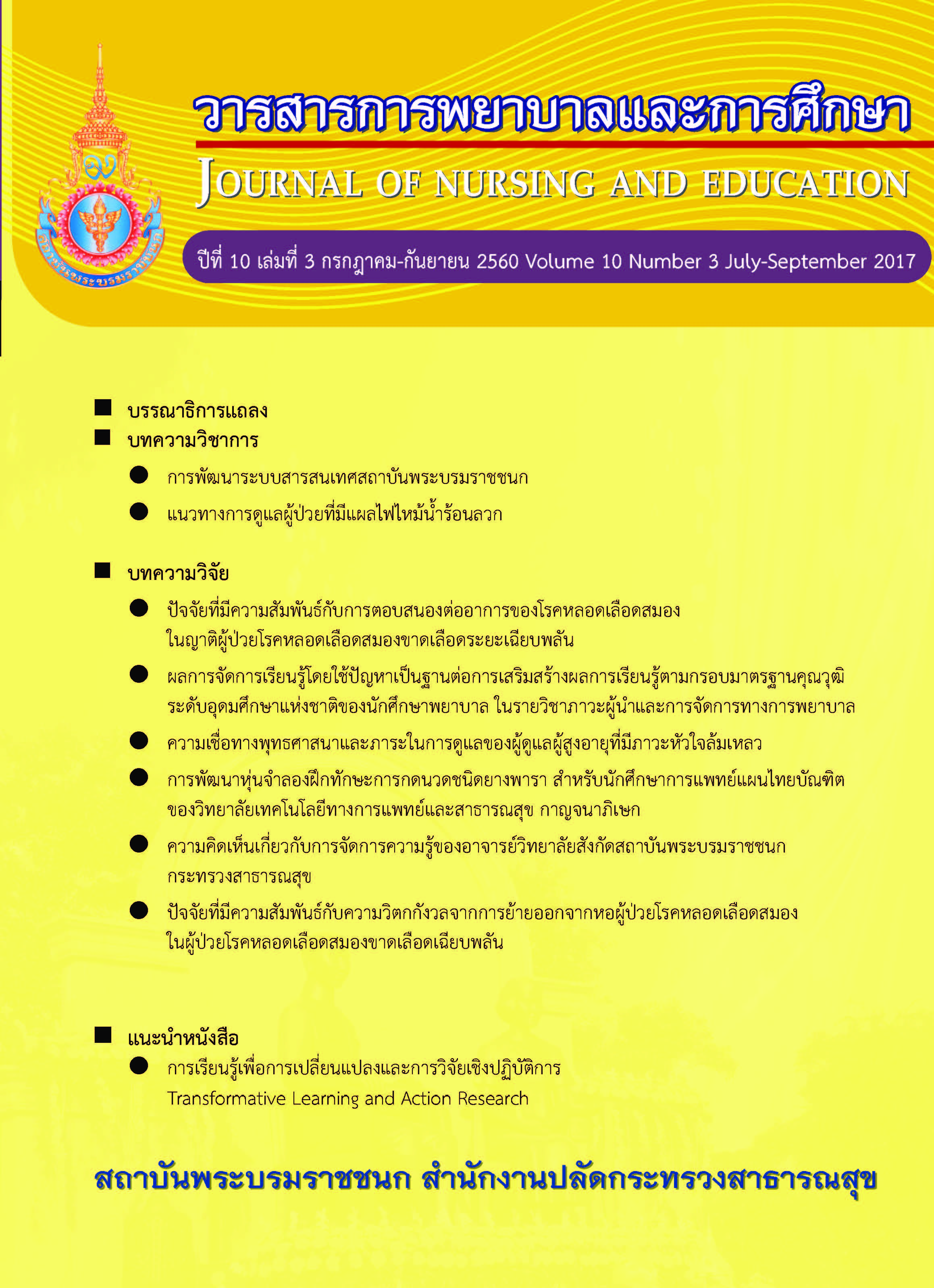ความคิดเห็นเกี่ยวกับการจัดการความรู้ของอาจารย์ วิทยาลัยสังกัดสถาบันพระบรมราชชนก กระทรวงสาธารณสุข
The opinions of lecturers to knowledge management in Colleges under the Jurisdiction of the Praboromarajchanok Institute Ministry of Public Health
คำสำคัญ:
แนวทางการพัฒนา, ศักยภาพด้านการวิจัยในวิชาชีพพยาบาล, Guidelines for the development, Research competency in nursing profession.บทคัดย่อ
บทคัดย่อ
การวิจัยนี้เป็นการวิจัยเชิงพรรณนามีวัตถุประสงค์เพื่อศึกษาความคิดเห็นและเปรียบเทียบความแตกต่างของปัจจัยเอื้อและผลการดำเนินงานจัดการความรู้ของอาจารย์วิทยาลัยสังกัดสถาบันพระบรมราชชนก กระทรวงสาธารณสุข โดยประยุกต์แนวคิดปัจจัยเอื้อการจัดการความรู้ของบุญดี บุญญากิจ และกระบวนการจัดการความรู้ของ กพร. มาใช้ในการศึกษา กลุ่มตัวอย่าง คือ อาจารย์จากวิทยาลัยพยาบาล จำนวน 165 คน และอาจารย์วิทยาลัยทางสาขาสุขภาพอื่น จำนวน 165 คน รวม 330 คน สุ่มเลือกตัวอย่างแบบแบ่งชั้น เครื่องมือที่ใช้ในการวิจัยเป็นแบบสอบถามแบบมาตราส่วน 5 ระดับ เรื่อง ความคิดเห็นเกี่ยวกับการจัดการความรู้ของอาจารย์วิทยาลัยสังกัดสถาบันพระบรมราชชนก กระทรวงสาธารณสุข หาค่าความตรงเนื้อหาโดยผู้เชี่ยวชาญ 3 ท่าน ค่าสัมประสิทธิแอลฟาของครอนบาช เท่ากับ 0.87 และ0.85 เก็บรวบรวมข้อมูลเดือนมิถุนายน 2559 - มกราคม 2560 วิเคราะห์ข้อมูลโดยหาค่าเฉลี่ย ส่วนเบี่ยงเบนมาตรฐาน และการทดสอบค่าเฉลี่ยของกลุ่มตัวอย่าง 1 กลุ่มที่มีความเป็นอิสระต่อกัน (Independent t -test)
ผลการวิจัย พบว่า 1) ความคิดเห็นเกี่ยวกับปัจจัยเอื้อการจัดการความรู้ของอาจารย์วิทยาลัยพยาบาลระดับมาก ( = 3.92, SD =0.65) อาจารย์วิทยาลัยทางสาขาสุขภาพอื่นระดับมาก ( =3.61, SD =0.74) และอาจารย์วิทยาลัยสังกัดสถาบันพระบรมราชชนกโดยรวมระดับมาก ( = 3.80, SD=0.76) 2) ความคิดเห็นเกี่ยวกับผลการดำเนินงานจัดการความรู้ของอาจารย์วิทยาลัยพยาบาลระดับมาก ( =3.74, SD =0.79) อาจารย์วิทยาลัยทางสาขาสุขภาพอื่นระดับปานกลาง ( =3.31, SD =0.78) และอาจารย์วิทยาลัยสังกัดสถาบันพระบรมราชชนกโดยรวมระดับมาก ( =3.59, SD = 0.81) 3) โดยปัจจัยด้านองค์กร วัฒนธรรมองค์กร การบ่งชี้ความรู้ และการแบ่งปันแลกเปลี่ยนเรียนรู้ แตกต่างกันอย่างมีนัยสำคัญทางสถิติ (P <.01)
ABSTACT
This descriptive study aim to exploring the level of opinions and comparing the differences in the enabling factors and work performance in managing the knowledge of colleges under the jurisdiction of the Praboromarajchanok Institute, Ministry of Public Health, based on the type and overview of each college.
This research, applied knowledge management enabling factor concept Boondee Bunyagid and knowledge management process Office of the Public Sector Development Commission.The sample was lecturers at colleges under the jurisdiction of the Praboromarajchanok Institute which were 165 lecturers nursing colleges and 165 lecturers colleges of health total 330 subjects.The sample was selected by stratified random sampling.The research implementation from questionnaires with 5level rating scale on The opinions of lecturers to knowledge management in Colleges under the Jurisdiction of the Praboromarajchanok Institute Ministry of Public Health.Content validity was determined by three experts. Cronbach’ s Alpha Coefficient reliability were0.87 and 0.85.Data were collected in June 2016 to January 2017.The statistics used mean, standard deviation and independent t-test.
The findings 1) opinions about nursing college knowledge management enabling factors were high level ( = 3.92, SD =0.65), as were the colleges of health ( =3.61, SD=0.74). Overall were high level ( = 3.80, SD =0.76) 2) Knowledge management work performance at nursing colleges were high level ( =3.74, SD=0.79) colleges of health were moderate level ( =3.31, SD=0.78).Overall were high level ( =3.59, SD =0.81)3) Organization, organizational culture, knowledge indicator and knowledge exchange factors differed significance (P<.01).
เอกสารอ้างอิง
1. Lorsuwannarat, T. Determinants of Modern Public Organizational Design. Nida Development Journa, 2008 ; 6(1) : 21-55. (in Thai)
2. Office of the Public-Sector Development Commission.Good Governance RatingBE (2003). 2003. (in Thai)
3. Office of the National Education Commission Office of the Prime Minister Kingdom of Thailand. National Education Act B.E. (1999) and Amendments (Third National Education Act B.E. (2010). Pimdeekarnpim Co. Ltd., 2010. (in Thai)
4. Office of the Higher Education Commission.Manual for the Internal Quality Assurance for Higher Education Institutions. Tana press co. ltd.2014. (in Thai)
5. Rodsom, A.Two decades of PhraBoromarajchanok Institute Follow the Father Production and development of health workforce. 1st Nonthaburi.Pimruk. 2013. (in Thai)
6. Ratanasuwan, W & Eamsama, S. The Development of the Knowledge Management Culture Promotion Model for Nursing Colleges under the Jurisdiction of Praboromarajchanok Institute, Ministry of Public Health, Thailand. Nursing Journal of The Ministry of Public Health, 2013 ; 23(2) : 65-78.
7. Anonrath, K. The Creation of knowledge assets for nursing instruction base on knowledge management concept in nursing colleges under Praboromarajchanok Institute Ministry of Public Health. A Dissertation submitted in partial fulfillments for the Degree of Doctor of Philosophy Program in Higher Education Department of Education Policy Management and Leadership Faculty of Education Chulalongkorn University.2012. (in Thai)
8. Boonyakij, B.Knowledge management from theory to practice. Bangkok: Thailand Productivity Institute. 2006. (in Thai)
9. Office of the Public Sector Development Commission & Thailand Productivity Institute. knowledge management from theory to practice. Bangkok. 2006. (in Thai).
10. Krejcie, R.V.& Morgan, D.W.Determining Sample Size for Research Activities. Educational and Psychological Measurement, 1970.
11. Poipitprueksanan, N.Research Methodology, Principles and Concepts Research Report Writing Techniques 8th edition Bangkok Expressnet Publishing Public Company Limited; 2013. (in Thai)
12. Chalongrut Intree.Factors Affecting Success in Knowledge Management of the Faculty of Nursing, Ratchathani University. Ramathibodi Nursing Journal, 2009; 15(1) :76-85.
13. Niramitwatthana, S.Factors Affecting Technological Achievement for Knowledge Management of Private Organization. Graduate School, Bangkok University.2017. (in Thai)
14. Smerchuar, N.Comparison of Proceeding in Knowledge Management between Chiang Mai Rajabhat University and Payap University. Master of Public Administration. Chiang Mai University.2009. (in Thai)
15. Panich, V.way of intelligent organization. Industrial Relations Journal, 2007; 8(3), 2 -3.
16. Ratanasuwan, W & Eamsamai, S. The Development of the Knowledge Management Culture Promotion Model for Nursing Colleges under the Jurisdiction of Prabormarajchanok Institute, Ministry of Pubilc Health,Thailand.Nursing Journal of the Ministry of Public Health, 2014 ; 23(3). 65-78.
17. Pitaktim, S.Factors of Organizational Culture Influencing Perceived Knowledge Management of Academic Instructorsat Nakhon Sawan Rajabhat University. Social Sciences Research and Academic Journa,2015 ; 30(10).91-117.
18. Kunton, V. Factors Influencing Knowledge Management of Information Personnel, Faculty of Medicine Siriraj Hospital, Mahidol University. Academic Services Journal, Prince of Songkla University, 2013;24(2), 112-128.
19. Senge, P. Classic work: The leader’s new work, building learning organizations. In M. Maybury, B. Thuraisingham, & D. Morey (Eds.), Knowledge management: Classic and contemporary works. Cambridge, MA: the MIT Press. 2001.






